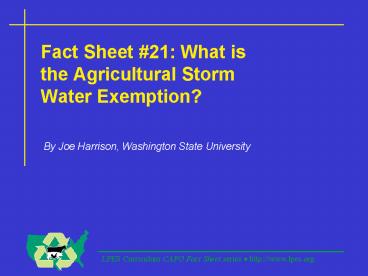Fact Sheet - PowerPoint PPT Presentation
1 / 15
Title:
Fact Sheet
Description:
... or overflow from animal watering systems; washing, cleaning, or flushing ... Process wastewater also includes any water that comes into contact with any raw ... – PowerPoint PPT presentation
Number of Views:67
Avg rating:3.0/5.0
Title: Fact Sheet
1
Fact Sheet 21 What is the Agricultural Storm
Water Exemption?
- By Joe Harrison, Washington State University
2
Appropriate Use of Manure and Process Wastewater
When manure and process wastewater are applied in
accordance with practices designed to ensure
appropriate agricultural utilization of
nutrients, it is a beneficial agricultural input.
3
Agricultural Storm Water Exemption
Manure and process wastewater that have been
applied in accordance with site-specific nutrient
management practices that ensure appropriate
agricultural utilization of the nutrients in the
manure and process wastewater.
4
Agricultural Storm Water Exemption (cont'd)
Dry weather discharges of manure or process
wastewater resulting from its application to
land area under the control of a CAFO would not
be considered an agricultural storm
water discharge and thus would be subject to
Clean Water Act requirements.
5
CAFOs are Required to Use Site-Specific Nutrient
Management Practices
- Identify appropriate, site-specific conservation
- practices to be used.
- Including buffers or equivalent practices to
control - runoff to waters of the United States
6
CAFOs are Required to Use Site-Specific Nutrient
Management Practices (cont'd)
- Identify methods for appropriate testing of
manure, litter, process wastewater, and soil. - Establish methods to land apply manure,
litter,or process wastewater according to
site-specific - nutrient management practices.
7
CAFOs are Required to Use Site-Specific Nutrient
Management Practices (cont'd)
- Identify records that will be maintained to
document the implementation and manage-ment of
the minimum components of a nutrient management
plan (see CAFO Fact Sheet 6 for more information
about record keeping).
8
Definition of Terms
- AFOAnimal Feeding Operation
- CAFOConcentrated Animal Feeding Operation
- NPDESNational Pollutant Discharge Elimination
System
9
Definition of Terms (cont'd)
- Process wastewaterWater directly or indirectly
- used in the AFO for any or all of the following
spillage or overflow from animal watering
systems washing, cleaning, or flushing pens,
barns, manure pits, or other AFO facilities
direct contact swimming, washing, or spray
cooling of animals or dust control. Process
wastewater also includes any water that comes
into contact with any raw materials, products, or
byproducts including manure, litter, feed, milk,
eggs, or bedding.
10
Author
Joe Harrison, a Nutrient Management Specialist
at Washington State University, can be reached
at harrison_at_puyallup.wsu.
11
Reviewers
- The author wishes to thank Wendy Powers, Iowa
State University Nora Mena, Washington State
Department of Agriculture David Schmidt,
University of Minnesota and John Gillies,
Washington State Natural Resource Conservation
Service, for their review of this fact sheet.
12
For More Information
Environmental Regulations Related ResourcesEPA
CAFO Phone Line202-564-0766 http//www.epa.gov/np
des/caforule/To obtain copy of
regulations http//www.epa.gov/npdes/afo/statecont
acts/To obtain state environmental agency
contacts http//www.epa.gov/agriculture/animals.ht
ml/To obtain compliance assistance information
from EPA http//cfpub.epa.gov/npdes/contacts.cfm?p
rogram_id7typeREGION/To obtain EPA Region
Animal Feeding Operation contacts
13
For More Information (cont'd)
- Land-Grant University Resources
- The local contact for your land-grant university
Cooperative Extension program is listed in the
phone book under "Cooperative Extension" or
"(county name) County Cooperative Extension." - http//www.reeusda.gov/1700/statepartners/usa.htm/
To obtain state Cooperative Extension contacts - http//www.lpes/To view the Livestock and
Poultry Environ-mental Stewardship (LPES)
curriculum resources
14
For More Information (cont'd)
- USDA Farm Bill Resources
- To obtain more information about the Farm Bill
2002, see the USDA-NRCS website at the following
URL http//www.nrcs.usda.gov/programs/farmbill/20
02/. - You can also contact your local USDA Service
Center, listed in the phone book under "U.S.
Department of Agriculture," or your local
conservation district.
15
Funding
- This material is based upon work supported by the
Cooperative State Research, Education, and
Extension Service, U.S. Department of
Agriculture the U.S. Environmental Protection
Agency, the National Agriculture Assistance
Center and the University of Nebraska
Cooperative Extension, University of
Nebraska-Lincoln, under Cooperative Agreement
Number 97-EXCA-3-0642.

